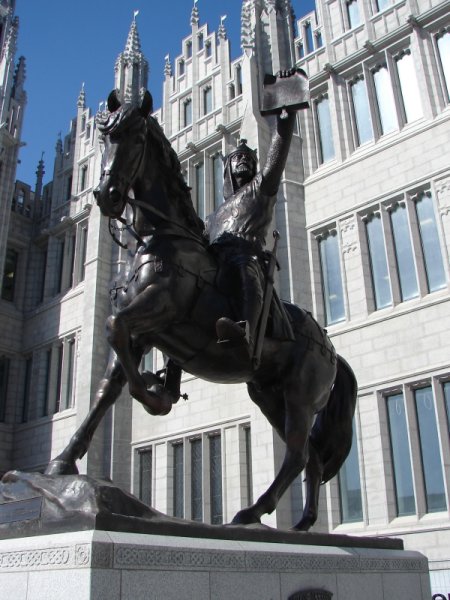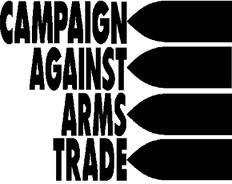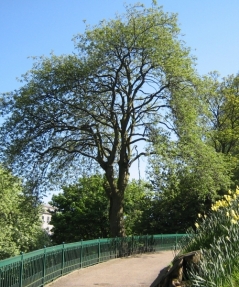Previous administrations sold off property at a fraction of real value (funny, no one can find the details of the police investigation that was meant to happen – watch this space). They also wrote off £11 million in unpaid debts. Here is a snapshot of where you tax money was deployed last year. The trend of arms’ length bodies, quangos, quasi-charities, consultants and private companies hiving tax money off continues apace. Here is a small snapshot of where some of your money has gone. By Suzanne Kelly
 Congratulations to Sir Ian Wood, lifetime achievement winner of a Northern Star business award. How wonderful.
Congratulations to Sir Ian Wood, lifetime achievement winner of a Northern Star business award. How wonderful.
A ceremony was held this past week; dignitaries ate dinners, media bodies were hired (Fiona Armstrong, compere) to appear and/or film this event, run by the Chamber of Commerce.
As self-congratulatory beanfeasts are concerned, this is not without precedent. But perhaps you should realise that you are helping to fund all these events at least in part, while being told there is little in the way of funds to keep schools open, to help the homeless, to provide round-the-clock care to those who need it and so forth.
Figures for this year’s awards are not made public, nor are they ever likely to be completely transparent, as there are now so many entities taking a slice of the pie.
Last year charity Station House Media Unit received some £2,300 for filming this event. The Chamber of Commerce has received a huge sum of money from us this year. During the Union Terrace Gardens referendum, it sent invoices between ACSEF unnamed contractors and the city council footed the bill.
When asked to name some of these suppliers – for instance whoever it was who received £150 (give or take) for a photo commissioned to show that UTG was ‘inaccessible’ (there is a huge sloping entrance by His Majesty’s Theatre), the Chamber wrote to say it was a private entity, and as such was not required to explain a thing.
A long, long time ago if you paid your tax, the government would directly use your money to buy goods services and employ people. Alas, this led to huge problems – such as your being able to clearly trace how much of your money was spent and where it went.
This is the age of the devolved responsibility entity, of quangos, special purpose vehicles and other entities which serve to obscure where your money goes and make salaries paid to those who act in these middle-man bodies invisible.
Tax money here in Aberdeen flows rather steadily to bodies such as Aberdeen Inspired, ACSEF, Aberdeen Chamber of Commerce, Station House Media Unit, and a host of consultants large and small.
While some of these bodies undoubtedly do good work – did they really provide value for money in 2013? And those that are social enterprises – does that put them above scrutiny? Does doing charitable work or providing training mean that any transparency as to how taxpayer money is spent should go out the window?
Here is a brief outline of how Aberdeen taxpayer’s money was employed in 2013 in a few situations.
A Tree For Every Citizen.
With great pride, Councillor Aileen Malone explained that this scheme had to be done in the most cost-effective way: it was only fair to the taxpayers seemed to be her approach. She was the convener of the Housing & Environment Committee, and pushed this scheme through claiming shooting the existing deer on Tullos was the only affordable thing to do for this great scheme (see Aberdeen Voice issues past).
In 2011 the taxpayer coughed up some £40,000 pounds to kill deer, raise fences and spray pesticide on the trees.
Here is a look at the invoices paid in 2013 for keeping the Tree for Every Citizen scheme going (note – this may not be a full list of costs):
| Company/Consultant | Invoice date | Brief Description | Amount inc. VAT |
| Bryan Massie | 19/12/13 | TFEC – Site management, weeding | 2493.49 |
| Bryan Massie | (invoice 629) | TFEC – Tullos maintenance | 9,943.98 |
| Bryan Massie | 17/5/13 | TFEC – herbicides – St Fitticks, Westfield, Seaton, Balgownie | 4303.80 |
| Bryan Massie | 17/5/13 | TFEC – Tullos ‘beating up’ and tree shelter | 16,682.04 |
| Bryan Massie | 12/2/13 | TFEC – Tullos | 28,968.00 |
| Sub Total | 62,391.31 | ||
| C J Piper / Chris Piper (noted for report claiming only a ‘vociferous minority’ objected to the TFEC scheme, said report not mentioning the tens of thousands of pounds he would be paid) | 1/10/13 | Preparation of strategy; time at £375 per day | 12,000 |
| C J Piper / Chris Piper | 26/9/13 | Scoping, survey, spatial plans | 6,000 |
| C J Piper / Chris Piper | 26/7/13 | Professional fees £950; travel 675 | 6,000 |
| Sub Total | 24,000 | ||
| Minimum cost to taxpayer 2013 for Tree For Every Citizen Scheme | 86,391.31 | ||
Combined with previous expenditures of £83,598 known to have been spent on the scheme, perhaps we could have let the meadow and the deer stay. (note: a petition asking for full disclosure of the costs, and a moratorium on shooting more deer until population figures are known at the least is awaiting approval from the city for its wording; it will be launched soon. This petition will also ask for a ‘comfort letter’ from the SNH/Forestry Commission: the city had to pay £43,800 back for the failure of Phase 1).
So £83,598 added to the above £86,391 makes £169,989. How the procurement exercise for our experts was carried out likewise remains a mystery.
Fence-Sitting.
But if Aileen Malone insisted fences were too expensive back in the day she had the deer shot as being an economical solution (in logic defying animal welfare charities such as the Scottish SPCA and Animal Concern) – she did have a point: fencing is rather expensive. Here is a summary of invoices received from Alpha Fencing in 2013:
Alpha Fencing.
| Invoice date | Brief Description | Amount inc. VAT |
| 26/314 (included in 2013 accounts) | Airyhall | 20,333 |
| 26/3/14 | 8,205 | |
| 30/8/13 | Duthie | 4,671 |
| 22/8/13 | Glashieburn | 2,185 |
| 4/2/13 | 8,939 | |
| 12/8/13 | 7,875 | |
| Total | 52,208 |
Perhaps there are other fencing contractors; Alpha catches the eye as they were involved in work on Tullos. If other fencing contractors likewise earned money from the taxpayer last year, perhaps we will be told what companies are involved.
Big Loser.
One area in which money was saved concerned the loss of the Big Partnership contract. Despite having operatives charging between £40 and £65 per hour, the invoices were not huge, and stopped c. May 2013.
Stewart Milne.
Stewart Milne’s companies have not done too badly out of the Aberdonian taxpayer. There was the small matter of land in Westhill sold to one of the Milne companies for a pittance, with the understanding that any profit would be shared with the city. That never happened and the Milne entity took the city to the highest courts in the country before losing (cost of this legal action unknown).
At the same time, the Milne machine won work worth nearly £10 million. In 2013 invoices submitted for contracts with Milne were as follows:
| Brief Description | Amount |
| Hayton Road | 30,044 |
| Bryon Park | 47,130 |
| Rorie Hall | 28,097 |
| Total | 105,271 |
Aberdeen Inspired
Perhaps someone from Aberdeen Inspired will be inspired to share with the business rate payers – i.e. the consumers – precisely what it does with all of the money it is given from the council. We’ve had bunting; the city has stumped up extra money for those trash compactors dotting the street. (nb – is there no waste segregation in these bins and if not, are we not just adding to landfill by using them?).
Inspired has also decided to use mobile phone signals to trace our footfall in the area; tracking how much time is spent inside a shop for instance. Data protection lobbyists are very concerned about the technology involved; Inspired insists it is completely anonymous.
At any rate, what is kept secret is how much anyone connected with Inspired is paid, how their procurement process works, and who is making the decisions. In case you think there is nothing more to Inspired than small change for craft stalls and banners, here is what they received from ACC last year:
| Invoice date | Brief Description | Amount inc. VAT |
| 2/10/13 | Bid Levy Collection, both outstanding and collection, plus VAT | 148,326.32 |
| 2/7/13 | 715,292.94 | |
| 14/2/14 (in 2013 accounts) | 30,038.73 | |
| 12/8/13 | 28,235.52 | |
| 29/3/13 | 21,695.80 | |
| 2/10/13 | 9,550.00 | |
| Subtotal re Bid Levy | 953,139.31 | |
| 4/12/13 | Trash bins | 18,489.60 |
| 25/10/13 | Trash bins | 18,489.60 |
| (date unclear) | Ice rink | 12,000.00 |
| (date unclear) | ‘wayfinding project’ | 31,830.60 |
| Subtotal non Bid Levy | 80,809.8 | |
| Total invoiced by Bid/Inspired to ACC 2013 | 1,033,949.11 | |
It would be interesting to see where all of this money has been used, what the overheads including salary are, as the tattered bunting blows in the breeze. No doubt some good work has been done – but what is the cost, what has been done with this consumer-generated, taxpayer-supplied million pounds: and has it resulted in increased sales for those who voted the scheme into existence?
SHMU
Station House Media Unit engages in training, and helping disadvantaged area residents interested in the media; it publishes brochures for and/or with the council. Last year SHMU was criticised when it used photographs created by people who had not given advance permission and who had not been offered payment for their work – this would be a standard business practice for any publisher.
SHMU reacted badly to exposure of this situation; it may well be a charitable institution doing good work – but that does not put it above scrutiny.
Considering that so much of its funding comes from the public, it would be interesting to see what salaries are paid, what the overheads are, how procurement is done, etc, etc. – but again, this is a body that while funded largely by the public is not accountable to the public under Freedom of Information legislation.
Here is a selection of some of the funds SHMU received last year: the Council had 43 pages of documentation pertaining to funds sought / funds released to SHMU:
| Invoice date | Brief Description | Amount |
| 29/11/13 | Pertains to community support fund grant offer; | 1,624 |
| 31/5/13 | Filming Start Awards (Chamber of Commerce award ceremony to business; Sir Ian Wood received a lifetime award in 2014) | 2,300 |
| Quarterly funding of 13,750/quarter | 55,000 | |
| Winter 2013; Spring 2014 | 7 community magazines | 11,929 |
| 4/12/13 | Additional cost for 7 magazines | 1,624 |
| (date unclear) | Training | 8,500 |
| 7/12/13 | Connecting communities through community media | 16,750 |
| Sub total for this selection of SHMU invoices | 97,727 | |
There were a number of youth employment-related invoices as well.
But far and away the biggest earners of the invoices examined were the Chamber of Commerce and PricewaterhouseCoopers.
Secret Chamber.
The Aberdeen and Grampian Chamber of Commerce acted as a de facto go-between during the Union Terrace Gardens referendum; ACSEF would commission work across a wide spectrum of services and price brackets. This would be invoiced to the City Council via the Chamber of Commerce.
Invoices of this type seen by Aberdeen Voice did not disclose who or what organisation performed the work undertaken. What procurement procedures were followed and if any ACSEF members directly benefitted from these invoices remains unclear at present: there seems to be no obligation ACSEF or the Chamber of Commerce to say how taxpayer money was spent.
Thirty one documents were presented by the City Council’s finance office covering invoices and funds paid to the Chamber in 2013. Some were for miniscule amounts such as breakfasts. Some were just a bit larger:
| Invoice date | Brief Description | Amount |
| 29/11/13 | Sponsorship of transport to Rio | £542.48 |
| 30/4/13 | 2112.00 | |
| 28/6/13 | 2112.00 | |
| 13/11/13 | 324.00 | |
| 29/11/13 | 542.48 | |
| 18/6/13 | Northern Star | 7,800.00 |
| 1/10/13 | Membership | 2,838.00 |
| 6/8/13 | Offshore Europe Breakfast | 588.00 |
| 28/2/13 | Research | 4,560.00 |
| 31/12/13 | Research | 4,560.00 |
| 28/2/13 | 1080.00 | |
| 31/12/13 | 540.00 | |
| 29/11/13 | 2,160.00 | |
| 29/11/13 | 7,020.00 | |
| 20/2/13 | 1,140.00 | |
| Total for approx. half of the 2013 invoices | £37,918.96 | |
Beancounters Beanfeast.
The accounting firms have done quite well this year. KPMG made a tidy £10,740; this was positively modest compared to PricewaterhouseCoopers.
PwC may be remembered for its projections during the UTG referendum: its projections for the web’s construction and associated prosperity were, shall we say, enthusiastic. As per an earlier article on the subject:
“PricewaterhouseCoopers have come up with some grandiose projections including the creation of some 6,500 permanent jobs and £122 million flowing into Aberdeen every year until c. 2023: all because of the granite web. PricewaterhouseCoopers were first paid £41,000 and change for TIF-related work in March 2010. Other invoices followed, and so far I have been shown by Scottish Enterprise £71,000 worth of PwC invoices.”
The firm still enjoys the generosity of the Aberdonian taxpayer. Its consultants received hundreds of pounds per day each; its invoices covered a spectrum of services from the (scandal-hit) crematorium to fraud work. Here is a list of their 2013 invoices to ACC in round figures:
| Invoice date | Brief Description | Amount |
| 15/7/13 | Pinewood | 1,800 |
| 3/2 | 170,949 | |
| 20/3/13 | HMRC | 1800 |
| 15/7/13 | 9,600 | |
| 15/10/13 | 5,200 | |
| 9/7/13 | 2,400 | |
| 3/12/13 | 33,270 | |
| 17/7/13 | 30,229 | |
| 16/9/13 | (included c £19K for crematorium) | 78,142 |
| 15/4/13 | 165,889 | |
| 18/12/13 | 59,281 | |
| 21/11/13 | 86,540 | |
| 8/11/13 | 13,678 | |
| 1/5/13 | 2,940 | |
| 29/5/13 | 11,206 | |
| 6/8/13 | Letter to HMRC | 900 |
| Total to PricewaterhouseCoopers 2013 | 673,824 | |
Summing Up.
The city has joined the ranks of other municipalities that have ‘outsourced’ functions in order to save money. This growing trend does not always stand up to scrutiny. Consultants are needed to run services which, if were previously not-for-profit when in the public sector, need to be profitable for those who have chosen to run them.
In days gone by, the reason people paid tax was that there were some functions – education, good health care, etc. – which ideally should be free of the need to turn a profit. Our taxes were meant to benefit the people and the causes that needed help.
As more and more outsourcing is done, transparency moves away. The city’s accounts this year allude to an incident of fraud. Is it possible that the more people and entities that grow around managing services, the higher the chance there is of fraud? Does the increasing lack of transparency lend itself to those who would commit fraud?
Can a private company such as PricewaterhouseCoopers that stands to make money if (for instance) a granite web is built be entirely trusted to be 100% impartial on weighing up the practicalities of a project which would benefit its profit line?
Should the city weigh more carefully how its arm’s length bodies engage in procurement? From the 2013 figures, a case could be made that the city needs to look into its financial arrangements more carefully (and that’s before we look at the costs of outsourced health care).
Audit Scotland had some strong recommendations to the council several years back. If lessons have been learnt, let’s hope we get a clearer picture in the future of where our money is going.
- Comments enabled – see comments box below. Note, all comments will be moderated.
[Aberdeen Voice accepts and welcomes contributions from all sides/angles pertaining to any issue. Views and opinions expressed in any article are entirely those of the writer/contributor, and inclusion in our publication does not constitute support or endorsement of these by Aberdeen Voice as an organisation or any of its team members.]

